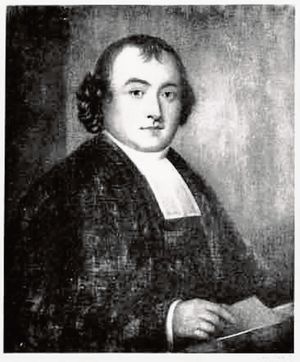The gravestone epitaph concludes with the words: ‘North Wales (the more immediate field of his ministerial labours for thirty years) will probably retain traces of his various and strenuous exertions to promote the kingdom of Christ till time shall be no more’.
The grave is that of Thomas Charles of Bala, best known for being the inspiration behind the founding of the Bible Society. He was born on 14 October 1755, exactly 250 years ago this month.
Fruitful life
The anonymous nineteenth-century epitaph was both too optimistic and too pessimistic. Too optimistic, in that very few of the rising generation in North Wales now know of Thomas Charles and fewer still consider him a significant benefactor.
In any present-day roll of fame, his name would appear far below Lloyd George and Aneurin Bevan, Gareth Edwards and Tom Jones — even Charlotte Church. This shows how rapidly a country’s Christian heritage, Christian virtues and Christian history can disappear once it thinks it has outgrown Christian truth.
But the author was too pessimistic in confining his remarks to North Wales. This is illustrated, for example, by the fact that the Portuguese branch of the Bible Society has no need of a printing press. Why? Because all Portuguese Bibles are printed in Brazil — where the demand for Bibles is so great that the Brazil Bible Society’s press is larger than any publishing house — religious or secular — in the whole of Portugal.
The production of hundreds of thousands of Bibles in Brazil, together with the existence of the presses and Bible Society branches in many other countries, is an abiding consequence of the fruitful life of Thomas Charles.
Spiritual work
He was born in a farmhouse called Pantdwfn, about ten miles south-west of Carmarthen. As a young boy he was mischievous but fond of reading. When he was twelve the Welsh translation of a book by John Bunyan affected him greatly, and began a spiritual work in him.
One result was that as a fourteen-year-old student at the Grammar School at Carmarthen, he attended meetings of the Methodists in the town, who took him to Llangeitho, Cardiganshire, to hear the much-talked-about preacher, Daniel Rowland. Years later, Thomas Charles wrote:
‘January 20, 1773, I went to hear Mr Rowland preach at New Chapel; his text was Hebrews 4:15. A day much to be remembered by me as long as I live. Ever since the happy day I have lived in a new heaven and a new earth. The change a blind man who receives his sight experiences does not exceed the change I at that time experienced in my mind…’
Joy unspeakable
He continues: ‘Then I was first convinced of the sin of unbelief or entertaining narrow, contracted and hard thoughts of the Almighty. I had such a view of Christ as our High Priest, of his love, compassion, power, and all-sufficiency, as filled my soul with astonishment — with joy unspeakable and full of glory.
‘My mind was overwhelmed and overpowered with amazement. The truths exhibited to my view appeared too wonderfully gracious to be believed. I could not believe for very joy. The glorious scenes then opened to my eyes will abundantly satisfy my soul millions of years hence in the contemplation of them…
‘Often in walking in the fields I looked up to heaven with joy and called that my home, at the same time ardently longing for the appearance of the glorious Saviour to take me forever to himself’.
Sally Jones
Determined to be a minister of the gospel, Thomas entered Oxford University in 1775. During one summer vacation he acted as a secretary to John Newton at Olney, and helped him prepare his first volume of letters, Cardiphonia, for the press.
Having matriculated and secured a curacy in Somerset, he used his final vacation to visit a friend in Bala, Merionethshire. Here something happened that would ensure his return to Wales and make Bala his headquarters for the last thirty-one years of his life — he met and fell in love with Sally Jones.
Sally was a godly member of the Bala Methodist -Society, but also a comparatively well-to-do, hard-working businesswoman — trading in cloth, clothes and general goods. As such, she was accustomed to young, hopeful, Methodist admirers. Thomas Charles’s subsequent five-year courtship occupies 12 chapters and 284 pages of D. E. Jenkins’s three-volume Life.
These pages contain predominantly Thomas’ ardent love letters, beginning ‘Dearest of mortals, my dearest, dearest Sally’, and expressing his undying love. There are also fewer, business-like replies from Sally — ‘Dear Reverend Sir’ — in which she tells him which of the neighbours has had the measles and the state of the weather.
Because Sally would not leave her parents, Charles would have to come to Bala, which he did. They were married in 1783.
Revival
The beginning of the Methodist Revival in Wales — under the ministries of Howell Harris, Daniel Rowland, Howell Davies, and others — had been confined predominantly to South Wales. To itinerate with the gospel in the north in 1780 was still a dangerous occupation because of persecution. Thomas Charles, even as an ordained clergyman, could not find any curacy that would receive him. After two Sundays in one church, he wrote:
‘Last Sunday, the whole parish with 2 or 3 of the principal inhabitants at their head came to me and accosted me in a rougher strain than I ever have been used to before. They insisted on my preaching no more in their church, for they added, you have cursed us enough already’.
Frustrated at doing nothing, and searching for work in neighbouring parishes, Thomas Charles had a dream about Judgement Day. He could not shake off the terror of the experience for a long time.
He had to act! He hired the small building owned by the Methodists to start a work amongst the Bala children. By taking this step he committed himself to the Methodists and his days as a Church of England minister were over.
God’s gift
In 1785 he preached for the first time at Llangeitho for Daniel Rowland who, having heard him, declared ‘Thomas Charles is God’s gift to north Wales’.
Because he was ordained, Charles could administer the Lord’s Supper to the Methodist converts, and Bala therefore became their main gathering place for Communion Sundays and Association meetings.
‘The Green’ at Bala is historically the most significant open-air preaching site in the whole of Great Britain. For a period of about a hundred years from about 1790, regular congregations numbering up to 15,000 and more would meet to hear preachers such as Robert Roberts (Clynnog), John Elias, Michael Roberts, William Roberts (Amlwch), John Jones (Talsarn), Henry Rees and many others.
Unlike these men, Thomas Charles was not among the first rank of preachers. But they all looked up to him as a leader in the work because of his scholarship and his organising abilities. He was an innovative pioneer in at least four areas, which we consider below.
The Circulating Schools
The common people were illiterate. Charles paid for young men — Methodist converts — to visit localities and set up night schools for children and adults. He wrote:
‘Whatever we attempted of this nature succeeded wonderfully; till the whole country was filled with schools of one sort or another; and all were taught at once. The blessed effects were corresponding; a general concern for eternal things took place in many large districts; many hundreds were awakened to a sense of sin, and their need of Christ, and I have every reason to believe are now faithful followers of him.
‘The schools are still carried on, and the effects the same in a greater or less degree; the number of teachers increase or diminish, as my finances will allow; all my income from a chapel which I serve, I devote wholly towards their support, being supported myself by the industry of my wife.
‘I pay every teacher £12 per annum. They continue half a year, or three quarters in one place, and are then removed into another part of the country. Three quarters of a year is found sufficient to teach our children to read their bibles well in the Welsh tongue.
‘I visit the schools myself, and catechise them publicly; I have the unspeakable satisfaction of seeing the general aspect of the country most amazingly changed; to see the wilderness blossom, as the rose, and the thirsty land, become springs of water; through the schools, and the preaching of the Gospel, the spread of divine knowledge is become universal. Bless the Lord, O my soul!’
The Sunday schools
The need for the circulating schools almost disappeared with the phenomenal success of Charles’s Sunday schools. He described them in a letter to the Religious Tract Society in 1806:
‘Thousands of young people, all over the country, have at this time their attention wholly engaged about divine things. They are learning Catechisms, and chapters out of the Bible, with wonderful facility.
‘It has been my delightful work, since I left London in December last, every Sunday to catechise publicly, and hear them repeat chapters before thousands of people … In order to give you some idea of the work, I would just mention some of the following particulars, which are strictly true:
‘Whole families, young and old, the governors and the governed, learn the Catechisms together, and chapters of the Bible; they have appeared together, and repeated alternately what they have learnt. All the grown-up young people, in some of our Societies, have done the same.
‘Boys and Girls, from eight to sixteen years old, learn whole books of the Scripture; and repeat what time will permit us to hear, such as the whole epistle to the Ephesians, Hebrews, etc; others learn select chapters to an astonishing number, such as 10, 20, 30.
‘One little girl learnt seventy-two psalms and chapters; and another the astonishing number of ninety-two, the list of which I have in my possession. Now, we want to feed this fire, so happily kindled in their minds, by putting into their hands a few useful Tracts in the Welsh language’.
He organised Sunday school festivals involving many hundreds of children. Schools from a large area would gather together and recite the Scriptures they had learnt. Most of the population of the district would attend, and often these festivals would witness the beginning of local religious revivals.
By these two types of school, Thomas Charles brought literacy to a significant proportion of the population of Wales.
Production and editing of Bibles
The story of Mary Jones and her barefooted walk to Bala for a Bible is well known, as are the subsequent labours of Thomas Charles to stir up support in the London religious societies for printing Bibles.
The response of Joseph Hughes of Battersea to one of Charles’s addresses to the Religious Tract Society in 1802 was, ‘If Bibles for Wales, why not Bibles for the world?’ and the ultimate result was the foundation of ‘The British and Foreign Bible Society’ in 1804.
In 1814, the year of his death, Charles completed the ten-year task of preparing a new text for an edition of the Bible. It proved to be one of the most accurate texts of the Welsh Bible ever produced.
Literary works
Having produced a literate nation, Charles then gave that nation a literature to read. He produced many catechisms, among which was YrHyfforddwr (‘The Instructor’) — a children’s catechism on which scores of thousands of Welsh children were nurtured in Christian truth. Its role in Wales was similar to that of the Shorter Catechism in Scotland.
His greatest work was his Bible Dictionary which remains today the finest exposition of Christian doctrines in Welsh. Mid-nineteenth-century cottages and farms of Wales would possess three or four books: Bunyan’s Pilgrim’s progress, Gurnall’s The Christian in complete armour (both translated into Welsh), William Williams’ hymns, and Charles’ Bible Dictionary.
Thomas Charles died on 5 October 1814. His beloved wife survived him by only 19 days. By supporting her husband for thirty years, and being ready to forego so much of her husband’s company and time, Sally was a means by which God provided for Wales — and the world — the gift of Thomas Charles.







